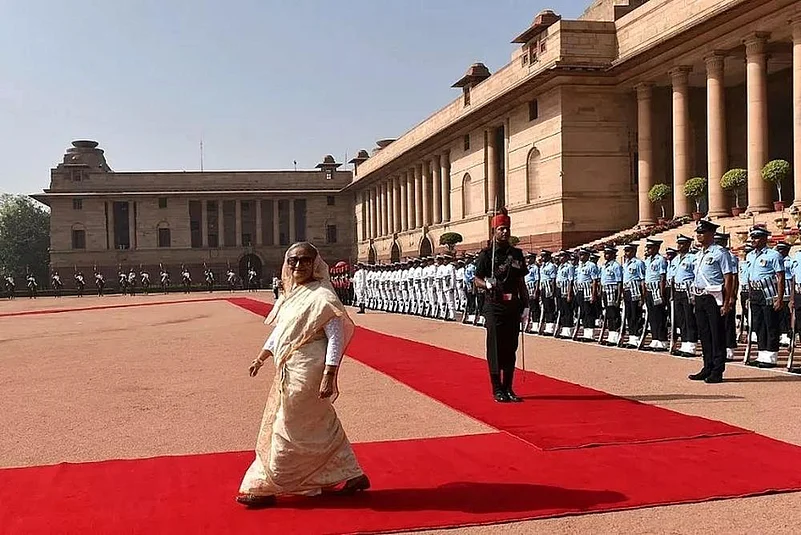India and Banladesh relations got a major boost with Bangladesh Prime Minister Sheikh Hasina’s visit. This is the first bilateral visit by Sheikh Hasina after National Democratic Alliance formed the government. The visit is important since it is her last visit before the parliamentary election in Bangladesh likely to be held in late 2018. The outcome of this visit will play a major role in shaping future of the politics in that country and also of the bilateral relationship. The visit showcases her commitment to friendship with India and progress of the bilateral relationship.
Politics in Bangladesh is divided on the nature of country’s relationship with India. Prime Minister Shiekh Hasina’s government is accused of favouring India because of her efforts to improve bilateral ties. The outcome of the visit will be closely scrutinised in Bangladesh, to measure the success of the visit.
Advertisement
The non-signing of the Teesta agreement has become a point of embarrassment for her government. The treaty was supposed to be signed during former Prime Minister Manmohan Singh’s visit to Bangladesh in 2011 but it was suspended at the last minute due to objection by the West Bengal Chief Minister Mamata Banerjee. Opposition in Bangladesh often highlights this as her major failure. Shiekh Hasina visiting India withstanding criticism in her country showcases maturity and trust in the relationship. She is not ready to make the relationship hostage to any, particularly issue.
To continue the present level of bonhomie between the two countries, the resolution of Teesta is a necessity. It will be wishful to deliver Teesta before the end of this tenure of the Awami League government.
Advertisement
India and Bangladesh have made significant progress in past few years, especially after the Awami League formed the government in 2009. Bangladesh responding to India’s security concern was the turning point for the relationship and it never looked back. Peaceful resolution of the land boundary dispute is a major landmark. India and Bangladesh are cooperating in areas of security, energy, trade and economic, connectivity etc. During this visit, the two countries have signed 25 agreements in areas including connectivity, energy, security, development which will further strengthen this cooperation.
Considering the complexities of the relationship in Bangladesh, this is one which needs special attention and constant pursuance. Nurturing of ties with Bangladesh is crucial because – India shares its longest border with that country. Also, the country is crucial for connectivity with north-eastern states. Besides, the two countries have common history, language, culture and geography. Also, people have familial and cultural ties. Due to these commonalities there are many challenges which need the cooperation of the two countries.
For the growth of bilateral relationship, there is a need for addressing each other’s concerns; and again to look for new avenues for cooperation. Considering the present trajectory in the relationship, the transformation of this relationship into a partnership will be desirable. The partnership between the two countries is important particularly in areas including fighting extremism and terrorism, disaster management, climate change, human development etc.
There is a lot that the two countries can learn from each other. Bangladesh is no more a country which was once described as a basket-case by American statesman Henry Kissinger. The country has made a record in human development, made significant economic progress; it is one of fastest growing economies globally. It is self-reliant in agriculture due to advancement made in areas of agriculture, its track record of research on mitigating climate change risk is impressive.
Advertisement
This visit is the reassurance of the ties of friendship between the two countries and an encouragement to work together.
The Author is a Fellow at the Observer Research Foundation, New Delhi




















